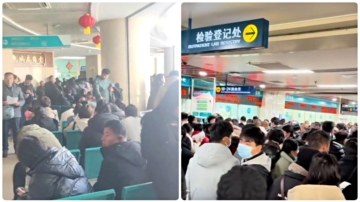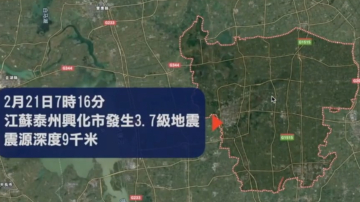【新唐人2013年05月24日訊】中共實施的計劃生育政策所衍生出來的養老問題,到今天,已經是中國面臨的一個嚴峻的社會問題。最近,在大陸網絡流傳著四條中共宣傳計劃生育和養老的標語,從中可以看到中共在將近40年裡,幾次推翻了自己的承諾,把作為政府應當承擔的養老責任,給推卸了。
1980年,中國開始執行一對夫婦只生育一胎的計生政策。在大陸論壇上現在流傳著四條標語,包括:上世紀80年代的計生標語是﹕「計劃生育好,政府給養老」﹔90年代變成了:「計劃生育好,政府幫養老」;2000年代則是:「養老不能靠政府」,到了2012年,政府號稱:「推遲退休好,自己來養老 」。
中國問題獨立評論員李善鑒:「隨著事情不斷的變化,慢慢的實際情況報導出來,並不是說和想像的、和宣傳的那樣,那它(中共)的口號也在變。它宣傳的時候不負責任的給你講,將來怎麼怎麼的美好,怎麼怎麼樣。」
大陸人口學專家、《大國空巢》一書的作者易富賢,他根據人口普查資料推斷,中國現有2億1千8百萬獨生子女,代表同時有4億3千6百萬的獨生子女父母。另外,在2000年的人口普查資料中顯示,這群獨生子女中,有超過1000萬會在25歲之前死亡。這也代表,會有2000萬名沒有子嗣撫養的獨生子女父母。
由於中國長期的低生育率,老齡化問題越來越嚴重。大陸媒體報導,全國老齡委辦公室副主任朱勇表示,今年,中國老年人口數量將突破2億大關,也將迎來第一個老年人口增長的高峰,而在2025年之前,老年人口每年將增長100萬。
中國問題專家鞏勝利:「老人現在最麻煩的是甚麼呢?生,繼續活下去也麻煩,因為他沒有保障體系。比如農村人口和城市人口,城鎮人口國家有一定的保障體系,但農村人口有錢就保,沒錢就不保。中國最麻煩的就是,大面積的,大概有50%的農村人口誰來管?地也沒有了,房子也沒有了。」
中國問題獨立評論員李善鑒也認為,老齡化問題給中國帶來的災難很難避免。那麼中共當局是如何應對這個自己造成的災難的呢?
去年的8月24號,全國老齡委辦公室副主任吳玉韶表示,在養老問題上,政府要承擔一定責任,但不能承擔全部責任。
而在今年的4月7號,中共「社保基金理事會」黨組書記戴相龍,他在參加「博鼇論壇」時聲稱,養老金有缺口,他建議延長退休年齡至65歲,來推遲養老金的領取年齡。
《化解國家資產負債中長期風險》這份研究報告預測,中國養老金缺口到今年將達到18萬億3億元。而中國全年財政收入也就是10萬億。去年12月17號,「中國社科院世界社保研究中心」曾發佈《中國養老金發展報告2012》,其中披露,2011年中國城鎮基礎養老保險個人帳戶空賬額,達2萬億2億元。
採訪/田淨 編輯/李靜 後製/蕭宇
Chinese Authorities Have Repeatedly Broken Promises Over Retirement Income Provision
China’s one-child policy, dictated by the Chinese
Communist Party (CCP), has resulted in an issue of lack
of income provision for the elderly.
The issue has become one of the most serious
challenges for the government today.
Recently, four CCP slogans on advocating birth control, and
retirement income provision have been seen widely on the net.
These slogans have proved that in over 30 years,
the CCP has repeatedly broken its previous promises.
The authorities have shirked their responsibilities
toward the provision of retirement pensions.
In 1980, China began to implement a
birth control policy of “One child per family”.
The following are four slogans that were widely used
by the CCP during the eighties.
In the 1980s, the slogan was: “Birth control is good,
the government will pay pensions.”
In the 1990s, it became: “Birth control is good,
the government subsidizes pensions.”
In the 2000s, it was “Pensioners cannot live off the government.”
In 2012, “Postponing retirement is good,
so as to be sure of earning your pension.”
(Independent commentator) Li Shanjian: “As time goes by,
the truth will gradually be exposed to the public.
The CCP’s slogans have kept on changing.
It just propagated irresponsibly, fooling the public with the
illusion of a blissful future that beckoned.”
Yi Fuxian, China’s expert in demography,
suggested from studying census data, that
China’s members of the one-child generation
have by now easily reached 218 million.
The census data in 2000 showed that in this group,
over 10 million would die before the age of 25.
That means 20 million one-child parents
would face childless lives.
Over the years, China has seen low fertility,
and a growing ageing problem.
China’s media has quoted Zhu Yong, deputy director of
office of National Committee on Ageing.
Zhu said that in 2013, the number of elderly in China
will exceed 200 million, for the first time.
The one-million annual growth in the ageing population
will continue until 2025.
(Expert in China issues) Gong Shengli:
“What’s the problem facing the elderly in China now?
They face insufficient subsistence allowances to live by.
The urban population has been covered
in the public pension system.
Whilst among the rural residents, only the richest
can afford pension contributions.
Now China’s biggest problem is, that about half of
the rural population face a life without pensions.
Their lands have been seized, and their houses demolished.”
Li Shanjian says, China cannot now escape a disaster
that is caused by the increase in numbers of elderly citizens.
How have the CCP authorities dealt with
this huge problem created by themselves?
In August 2012, Wu Yushao, deputy director of the
office of the National Committee on Ageing, said that
the CCP shall partially, instead of fully,
cover retirement pension provision.
In April, Dai Xianglong, the Party chief of the
National Council for the Social Security Fund, alleged
that China’s pension fund cannot make ends meet.
Dai proposed rising the retirement age to 65,
in order to delay taking pensions.
A research report predicts that China’s pension shortfall
will reach 18.3 trillion yuan in 2013.
China’s full-year fiscal revenue is about 10 trillion yuan.
In December 2012, an official report on the pension fund
stated that in 2011, a total shortfall of personal pension accounts hit 2.2 trillion yuan.
1980年,中國開始執行一對夫婦只生育一胎的計生政策。在大陸論壇上現在流傳著四條標語,包括:上世紀80年代的計生標語是﹕「計劃生育好,政府給養老」﹔90年代變成了:「計劃生育好,政府幫養老」;2000年代則是:「養老不能靠政府」,到了2012年,政府號稱:「推遲退休好,自己來養老 」。
中國問題獨立評論員李善鑒:「隨著事情不斷的變化,慢慢的實際情況報導出來,並不是說和想像的、和宣傳的那樣,那它(中共)的口號也在變。它宣傳的時候不負責任的給你講,將來怎麼怎麼的美好,怎麼怎麼樣。」
大陸人口學專家、《大國空巢》一書的作者易富賢,他根據人口普查資料推斷,中國現有2億1千8百萬獨生子女,代表同時有4億3千6百萬的獨生子女父母。另外,在2000年的人口普查資料中顯示,這群獨生子女中,有超過1000萬會在25歲之前死亡。這也代表,會有2000萬名沒有子嗣撫養的獨生子女父母。
由於中國長期的低生育率,老齡化問題越來越嚴重。大陸媒體報導,全國老齡委辦公室副主任朱勇表示,今年,中國老年人口數量將突破2億大關,也將迎來第一個老年人口增長的高峰,而在2025年之前,老年人口每年將增長100萬。
中國問題專家鞏勝利:「老人現在最麻煩的是甚麼呢?生,繼續活下去也麻煩,因為他沒有保障體系。比如農村人口和城市人口,城鎮人口國家有一定的保障體系,但農村人口有錢就保,沒錢就不保。中國最麻煩的就是,大面積的,大概有50%的農村人口誰來管?地也沒有了,房子也沒有了。」
中國問題獨立評論員李善鑒也認為,老齡化問題給中國帶來的災難很難避免。那麼中共當局是如何應對這個自己造成的災難的呢?
去年的8月24號,全國老齡委辦公室副主任吳玉韶表示,在養老問題上,政府要承擔一定責任,但不能承擔全部責任。
而在今年的4月7號,中共「社保基金理事會」黨組書記戴相龍,他在參加「博鼇論壇」時聲稱,養老金有缺口,他建議延長退休年齡至65歲,來推遲養老金的領取年齡。
《化解國家資產負債中長期風險》這份研究報告預測,中國養老金缺口到今年將達到18萬億3億元。而中國全年財政收入也就是10萬億。去年12月17號,「中國社科院世界社保研究中心」曾發佈《中國養老金發展報告2012》,其中披露,2011年中國城鎮基礎養老保險個人帳戶空賬額,達2萬億2億元。
採訪/田淨 編輯/李靜 後製/蕭宇
Chinese Authorities Have Repeatedly Broken Promises Over Retirement Income Provision
China’s one-child policy, dictated by the Chinese
Communist Party (CCP), has resulted in an issue of lack
of income provision for the elderly.
The issue has become one of the most serious
challenges for the government today.
Recently, four CCP slogans on advocating birth control, and
retirement income provision have been seen widely on the net.
These slogans have proved that in over 30 years,
the CCP has repeatedly broken its previous promises.
The authorities have shirked their responsibilities
toward the provision of retirement pensions.
In 1980, China began to implement a
birth control policy of “One child per family”.
The following are four slogans that were widely used
by the CCP during the eighties.
In the 1980s, the slogan was: “Birth control is good,
the government will pay pensions.”
In the 1990s, it became: “Birth control is good,
the government subsidizes pensions.”
In the 2000s, it was “Pensioners cannot live off the government.”
In 2012, “Postponing retirement is good,
so as to be sure of earning your pension.”
(Independent commentator) Li Shanjian: “As time goes by,
the truth will gradually be exposed to the public.
The CCP’s slogans have kept on changing.
It just propagated irresponsibly, fooling the public with the
illusion of a blissful future that beckoned.”
Yi Fuxian, China’s expert in demography,
suggested from studying census data, that
China’s members of the one-child generation
have by now easily reached 218 million.
The census data in 2000 showed that in this group,
over 10 million would die before the age of 25.
That means 20 million one-child parents
would face childless lives.
Over the years, China has seen low fertility,
and a growing ageing problem.
China’s media has quoted Zhu Yong, deputy director of
office of National Committee on Ageing.
Zhu said that in 2013, the number of elderly in China
will exceed 200 million, for the first time.
The one-million annual growth in the ageing population
will continue until 2025.
(Expert in China issues) Gong Shengli:
“What’s the problem facing the elderly in China now?
They face insufficient subsistence allowances to live by.
The urban population has been covered
in the public pension system.
Whilst among the rural residents, only the richest
can afford pension contributions.
Now China’s biggest problem is, that about half of
the rural population face a life without pensions.
Their lands have been seized, and their houses demolished.”
Li Shanjian says, China cannot now escape a disaster
that is caused by the increase in numbers of elderly citizens.
How have the CCP authorities dealt with
this huge problem created by themselves?
In August 2012, Wu Yushao, deputy director of the
office of the National Committee on Ageing, said that
the CCP shall partially, instead of fully,
cover retirement pension provision.
In April, Dai Xianglong, the Party chief of the
National Council for the Social Security Fund, alleged
that China’s pension fund cannot make ends meet.
Dai proposed rising the retirement age to 65,
in order to delay taking pensions.
A research report predicts that China’s pension shortfall
will reach 18.3 trillion yuan in 2013.
China’s full-year fiscal revenue is about 10 trillion yuan.
In December 2012, an official report on the pension fund
stated that in 2011, a total shortfall of personal pension accounts hit 2.2 trillion yuan.








